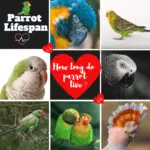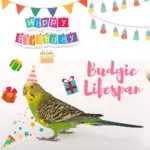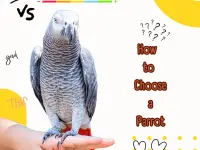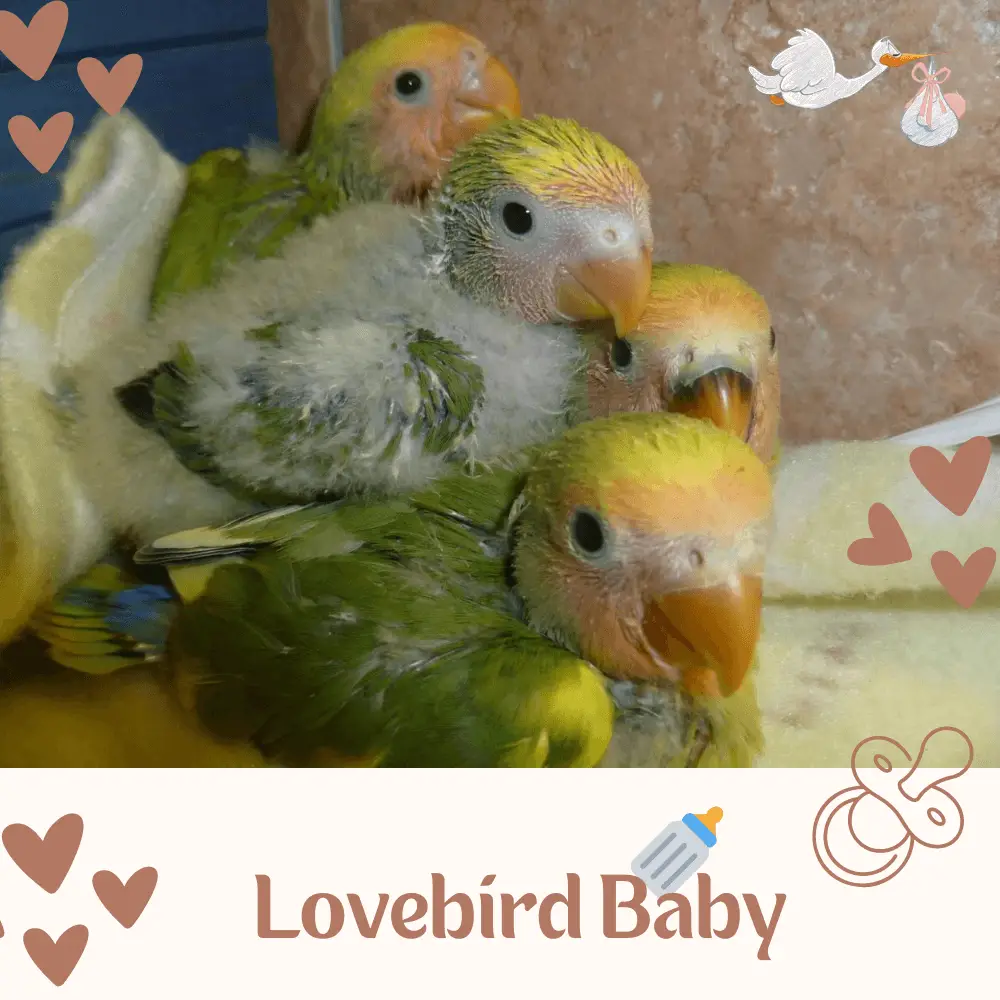
To be honest, I was literally scared to touch my lovebird baby named Mumu. We purchased it from a pet store on March 12, 2016. I had never raised a baby bird before; therefore, I had no idea. The internet turned out to be a huge help, guiding me in my state of worry.
Nevertheless, I mustered up my courage and decided to feed it. I opened the incubator and gently lifted the sleeping Lovebird Baby.
He was clearly surprised and rushed to bite me. I stifled a laugh at his meaningless attempt to scare me. Eventually, I started feeding him.
Baby Lovebird Care
It is very important to remember these points for the safety and well-being of your lovebird.
- Leave fresh water for your lovebird. It only takes a second to change the water.
- Clean perches and dishes while the birds nibble. Be sure to rinse thoroughly after using detergent or disinfectant.
- Never use Lysol etc. It is difficult to wash off all the residue.
- Take your bird outside with you if the weather permits.
- Supervise your bird with children or strangers.
- Supervise all animals when they are around your bird.
- Provide a cage large enough for your bird to have MORE than enough room to move and flap their wings.
- Provide your bird with different and stimulating toys to chew on.
- Do not cook with Teflon; if overheated, the gas emitted can be fatal to your bird.
- Do not smoke around your bird. Nicotine is lethal to birds.
- Don’t cook with a bird on your shoulder. Kitchens can be very dangerous.
- Don’t let your bird chew on surfaces or plants that can be deadly or poisonous if ingested. Be aware of lead and zinc toxicity.
- Don’t buy toys for your bird that have dog leash-type clips or jingle-type bells. (Toes can be grabbed easily).
- Do not bring any other birds that have not been tested by an avian veterinarian in contact with your bird.
- Don’t assume a bird is 100% healthy because it has never been “sick”.
Do lovebirds bite
Baby lovebirds aren’t mean; rather, they may be afraid. They use aggression as their defense. Never hit or yell at your bird. They also have feelings that are hurt. Always speak calmly and ignore bad behavior if it happens.
Baby Lovebird Formula
You will need boiled water, baby bird food powder, a syringe, and a feeding spoon (as your baby grows).
- Boiling water is essential to kill germs that could harm your baby bird.
- Mix a little powder and water until the consistency is fine (not too thick or too watery). There should be no lumps and blocks in the formula.
- Fill the syringe between 6 and 8 ml. Check the formula temperature using the palm of your hand. (Warning: high-temperature formulas can burn your baby’s throat).
- Give this amount of formula every 3 to 4 hours depending on your baby’s needs. Check your baby crop (the area around the stomach, check the picture below).
SOURCE: Lovebird Nursery
How to feed the baby
You must be very gentle when feeding your baby bird. The technique is simple, but it must be performed with great care and caution.
- Feed your Lovebird Baby when he is hungriest. You will know this by showing him the syringe. It will screech and jump forward eagerly.
- Your Lovebird Baby head should be tilted up.
- Gently place the tip of the syringe into your baby’s beak and begin suckling. If done correctly, you will see your bird swallow food. When swallowing, your bird will tilt its head or show body movements. Do not rush, always feed slowly.
- Check the harvest; if it is bulging, you should stop feeding your bird. You will also notice two bubble-like formations on your baby’s back. Do not feed after that.
What to do after breastfeeding
- Clean your Lovebird Baby beak with a clean towel.
- Put your bird to sleep by gently stroking its feathers.
- Give your bird plenty of rest.
What do weaned lovebirds eat
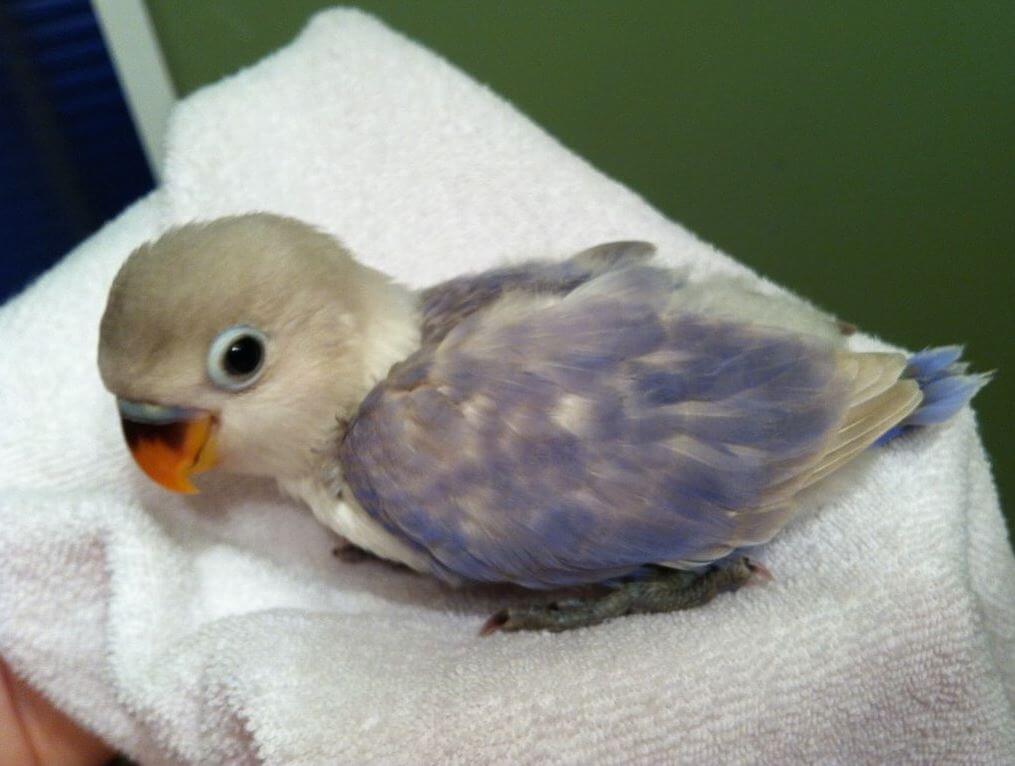
You discover that your lovebird baby is weaned (used to going without something he has become addicted to) from the formula. What should you do? Here is the answer:
Offer seeds, fresh fruits, and vegetables every day. Corn is particularly important in their diet. Lovebird baby could eat just about anything.
Fresh foods for lovebirds
A lovebird’s list of favorite fresh foods includes:
- Apples
- Oranges
- Grapes
- Mangoes
- Plums
- Broccoli
- Peas
- But
- Beans
- Pasta
Remember: how you take care of your bird will determine its health and loyalty. Lovebirds are playful and sociable. Give them plenty of attention and love them for who they are.
What if your lovebird was afraid of new foods?
Once you feel your baby needs weaning, introduce her to new foods: give her corn, bananas, and seeds. Your pet may become frightened and cry (make small, short sounds) as a result.
Lovebird Baby may puff up their feathers and try to attack the new food. Show new foods daily and try to feed them. They will reject it at first. Keep trying to feed them until their fear subsides. It happened in my case and can happen in yours as well.
Lovebird baby nest
SOURCE: Brighter Days Aviary
Question: At what age can I stop feeding formula?
Answer: That’s when the baby is 1.5 months old. After that, wean your baby by introducing seeds, fruits, and green leaves.
Question: If I touch the baby lovebird to feed it when I go to school, can I put it in the crate with its parents? (The eggs haven’t hatched yet.)
Answer: The baby lovebird needs to be fed by the mother lovebird until it is two weeks old. You can hand-feed the chick when it is about three weeks old.
Question: How many days does it take to hatch a lovebird egg?
Answer: It usually takes about 21-23 days for an egg to hatch, but my lovebirds’ chick was born after 25 days.
Question: Should I feed my lovebird baby chicks at night? When did you feed Mumu?
Answer: Feed them once before sleeping. The time between morning and evening can be divided into a feeding pattern every two to three hours.
Question: Should I leave fresh water for the baby lovebird or the little lovebirds?
Answer: You should keep fresh water available for baby lovebirds at least one month old and mature lovebirds.
Question: Should I keep the baby lovebird away from the mother once I start feeding it?
Answer: No, you can feed the chick and place it near the mother lovebird when you are done.
Question: Can I make lovebird baby formula without baby bird food powder? What should I do with it?
Answer: You can make a porridge-like food with pureed fruits and vegetables (avoid seeds, avocados and sweet/salty foods). It is best to purchase the formula powder available at pet stores. Good brands contain all the nutrients needed for healthy growth.
Question: Do all the eggs hatch?
Answer: No, only a few eggs hatch.
Question: How do you know the female lovebird from the male?
Answer: A female lovebird lays eggs, sits with a wider stance, and is slightly heavier than the male.
Question: Is it okay to choose the baby lovebird (27 days old) to feed?
Answer: Yes, it is normal to feed them once they are about three weeks old.
Question: How do I keep my 3-week-old baby lovebird clean?
Answer: Please give the chick a bath when it is 5 weeks old. Until then, you can gently rub her beak and body with a soft, damp towel if she gets dirty after feeding.
Question: Should I feed my 3-4 week old lovebird boiled bird food seeds?
Answer: No need to boil the seeds.
Question: I have a lovebird that is now 5 years old, I hand raised her. She continues to lay eggs every year. Would it be wise to introduce her to a new baby lovebird?
Answer: Please introduce her to a healthy adult male lovebird and let them get to know each other. A baby lovebird will be taken care of by her if she is good with new birds/people.
Question: Should a 2-week old love bird be given water?
Answer: No, please wait until the bird is a month old.

